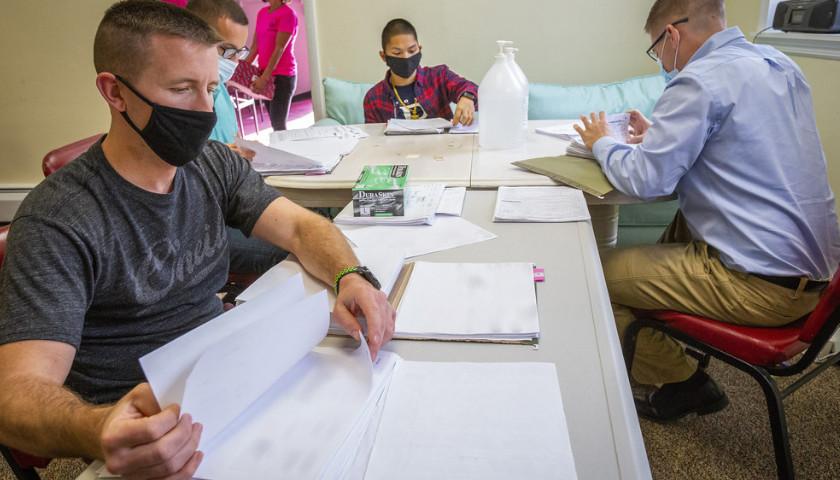David Mast, the president of AZ Voters Rights, filed a lawsuit against the State Bar of Arizona last week, alleging it targets conservative attorneys. Mast said due to creating fear among attorneys, he cannot find any to represent him in lawsuits related to conservative causes, violating his “constitutional rights to freedom of expression, association, and petition,” which is “viewpoint discrimination.”
AZ Voters Rights is “a non-profit organization dedicated to educating and defending the voters state and constitutional rights in Arizona,” according to its website.
He filed the lawsuit pro se, without an attorney, since he “is unable to find an attorney either within or without Arizona who is willing to file this suit due to likely retaliation by Defendants.”
Mast listed several conservative attorneys who the SBA targeted for their election work; State Representative Alex Kolodin (R-Scottsdale), Ryan Heath, Jen Wright, Kurt Olsen, Andrew Parker, Dennis Wilenchik, Jack Wilenchik, Brett Johnson, Eric Spencer, Kory Langhofer, Thomas Basile, “and many others.”
Mast said he “brings this action to combat the politicized, ‘Star-Chamber’-like weaponization of the State Bar of Arizona (‘SBA’), which is acting as a clan to target attorneys who take on cases advocating for conservative causes and candidates, such as ensuring election integrity and preserving First Amendment and other constitutional rights. As a result of the Bar’s discriminatory actions as alleged herein, Plaintiff has been unable to associate with and hire attorneys to take on conservative causes on Plaintiff’s behalf for fear of retaliation and intimidation by the SBA in violation of his First Amendment rights to freely express his views, associate, and petition the government for redress.”
He said that “the SBA disproportionately discriminates against, by investigating and prosecuting, attorneys engaging in litigation relative to elections and constitutional claims, specifically targeting attorneys who represent conservative (i.e., Republican) candidates and causes in a way that is statistically significant as compared to attorneys representing liberal (i.e., Democrat) candidates and causes.”
In contrast, he said the SBA quickly dismisses complaints against attorneys representing liberal candidates and causes “without a sufficient investigation to protect such attorneys despite clear evidence of misconduct.’
When bar complaints were filed against Cochise County Attorney Brian McIntyre, an election fraud denier, over a Super Extreme DUI, the SBA secretly gave him a diversion agreement to keep his law license and his elected position.
After the Cochise County Supervisors voted to conduct a hand count during the 2022 general election, McIntyre told them he refused to represent them as their counsel if they were sued or prosecuted, saying they would be personally liable. When the Cochise County Supervisors voted not to certify the election, citing the irregularities, McIntyre threatened to prosecute them.
Mast accused the SBA of targeting conservative election attorneys involved in litigation over the election irregularities in 2020 and 2022.” He singled Maricopa County out as “incapable of running elections without numerous controversies.”
Mast said the county is a “lightning rod for challenges to election integrity and the laughingstock of the Nation.” He expressed shock that the county “will likely not know who won elections until after Thanksgiving of this year!”
He cited the tabulation problems in Maricopa County’s 2022 election, which “potentially threw close elections to Democrat candidates and liberal propositions.”
Mast, a former government contractor, raised the questionable practice of Maricopa County Elections signature reviewers comparing ballot affidavit signatures from voters to signatures that were not their original voter registration signatures, as required by law. He noted that Yavapai County Superior Court Judge John Napper ruled last year that the practice violated the law.
Additionally, Mast pointed out Maricopa County’s “humanly impossible” rate of verifying signatures in a few seconds or less per signature. He listed off more problems in the 2022 election, including votes being changed after they were cast, “Door 3” ballots not counted, chain of custody problems with ballots, and votes cast by people who were not eligible.
He brought up the nearly 100,000 people discovered on the voter registration rolls last week in Maricopa County who had never provided proof of citizenship. Mast went on, “In addition to elections being botched, legitimate claims of censorship have emerged as state and county officials aim to quash criticism of the bungled elections.”
He revealed that “members of the SBA’s Board of Governors have acted as complaint signatories against such attorneys despite having no direct connection to the litigation at issue. … [N]ot one member of the SBA’s Board of Governors is a conservative.”
Attorney Dianne Post, who has been heavily involved with the SBA for years, filed 22 complaints since 2021 against election attorneys who she claimed had “filed many false and fraudulent claims without legal facts or legal analysis in the Arizona courts, and wasted a lot of time and money.”
As a result of complaints like hers, the Arizona Supreme Court adopted an emergency temporary rule earlier this month limiting bar complaints filed by anyone other than someone with a connection to the attorney.
Mast also tackled the SBA’s mandatory nature since attorneys cannot practice law in Arizona without being members. There are 19 states that do not have mandatory bars. The Goldwater Institute has sued state bars to try to break up the mandatory nature, focusing on the aspect that the bars use the dues to engage in political conduct, violating the First Amendment. Some believe the requirement violates Arizona’s right-to-work laws.
Since the SBA “has an exclusive monopoly on the practice of law in Arizona,”
Mast argued that it is a “quasi-governmental entity” acting “under the color of state law when selectively punishing election attorneys based upon the political interests of their clients.” He said this is not part of its duties related to regulating the practice of law and constitutes state-sanctioned viewpoint discrimination, which is unconstitutional.
For relief, Mast demanded that the court declare the SBA’s actions violating his First Amendment rights of expression, association, and petition. He asked the court to set a “higher standard of culpability and proof to justify investigating” attorneys representing conservative causes and candidates and to stop the SBA from further violations.
Mast, represented by attorney Ryan Heath, filed a lawsuit against numerous Arizona officials in August 2023. The complaint asked the court to decertify the 2022 election. It cited lawbreaking regarding signature verification on mail-in ballots, asserting that the violations resulted in “hundreds of thousands of illegal votes in all statewide results for the 2022 General Election.”
The SBA has come under intense criticism in recent years for targeting conservative attorneys.
– – –
Rachel Alexander is a reporter at The Arizona Sun Times and The Star News Network. Follow Rachel on Twitter / X. Email tips to [email protected].





